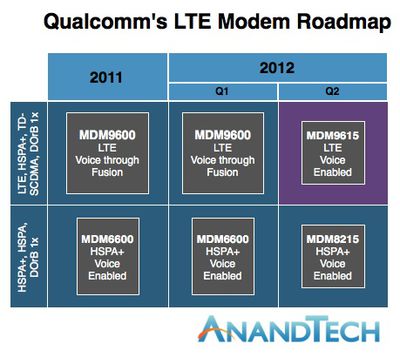Qualcomm Supply Issues Providing Further Fuel for Speculation of Fall iPhone Release
Qualcomm yesterday warned analysts that it is experiencing supply issues with some of its advanced mobile phone chips, particularly its new 28-nm modem chips set to power the next wave of LTE devices.
"At this stage we cannot secure enough supply to meet the increasing demand we are experiencing," Chief Executive Paul Jacobs told analysts on a conference call, adding that the issue would limit revenue growth this year. [...]
"Demand went so far ahead of availability that we've decided to start spending more money to get more supply as soon as possible," [Chief Financial Officer Bill Keitel] told Reuters. "Any time we can't make a customer totally happy I'm going to worry. You don't want to give a customer a reason to go elsewhere."
As a result of the issues, analysts believe that vendors may have to slow their rollout of new devices, and a report out today from Piper Jaffray's Gene Munster predicts that the next-generation iPhone will arrive in October.
 Qualcomm's LTE modem roadmap (Source: AnandTech)
Qualcomm's LTE modem roadmap (Source: AnandTech)Munster had previously been modeling for an August launch as a hedge between those thinking the device may arrive in June and those thinking it will arrive in a September-October timeframe similar to the iPhone 4S. Apple is expected to use Qualcomm's 28-nm MDM9615 modem chip in its next-generation iPhone to provide LTE data and voice services, and the chip appears to be one of those impacted by Qualcomm's supply issues.
QCOM will likely support an Apple iPhone launch in October. Based on our checks, we believe the design win momentum of QCOM's 28nm products has been exceptionally strong and a 28nm LTE baseband is likely designed into the next iPhone. QCOM's supply issue likely pushes the launch of the iPhone to October. Based on the increased capital spending this year from TSMC and QCOM's efforts over the last quarter to port its 28nm designs to UMC and probably Global Foundries, we think QCOM will have the capacity to support a Q4 LTE iPhone 5 launch. Moreover, the slow wireless infrastructure spending in 1H:12 is also likely a result of the lack of availability of a low power 28nm LTE baseband modem.
Apple may have been planning for a September-October iPhone launch all along, but Qualcomm's issues seem to make it less likely that those holding out hope for an earlier launch will see something closer to the June-July timeframe that had been the traditional launch window prior to last year.
Munster believes that it is "irrelevant" whether the iPhone launches in August as his model currently predicts or in October, with the primary driver of success being whether the upgrade is a compelling one for consumers. And with the next-generation iPhone expected to offer LTE support and carry a redesigned form factor, it seems likely that it will be an attractive device for both new and upgrade customers.
Popular Stories
Apple is not expected to release a standard iPhone 18 model this year, according to a growing number of reports that suggest the company is planning a significant change to its long-standing annual iPhone launch cycle.
Despite the immense success of the iPhone 17 in 2025, the iPhone 18 is not expected to arrive until the spring of 2027, leaving the iPhone 17 in the lineup as the latest...
Language learning app Duolingo has apparently been using the iPhone's Live Activity feature to display ads on the Lock Screen and the Dynamic Island, which violates Apple's design guidelines.
According to multiple reports on Reddit, the Duolingo app has been displaying an ad for a "Super offer," which is Duolingo's paid subscription option.
Apple's guidelines for Live Activity state that...
Apple is planning to release a low-cost MacBook in 2026, which will apparently compete with more affordable Chromebooks and Windows PCs. Apple's most affordable Mac right now is the $999 MacBook Air, and the upcoming low-cost MacBook is expected to be cheaper. Here's what we know about the low-cost MacBook so far.
Size
Rumors suggest the low-cost MacBook will have a display that's around 13 ...
Govee today introduced three new HomeKit-compatible lighting products, including the Govee Floor Lamp 3, the Govee Ceiling Light Ultra, and the Govee Sky Ceiling Light.
The Govee Floor Lamp 3 is the successor to the Floor Lamp 2, and it offers Matter integration with the option to connect to HomeKit. The Floor Lamp 3 offers an upgraded LuminBlend+ lighting system that can reproduce 281...
Belkin today announced a range of new charging and connectivity accessories at CES 2026, expanding its portfolio of products aimed at Apple device users.
UltraCharge Pro Power Bank 10K with Magnetic Ring
The lineup includes new Qi2 and Qi2.2 wireless chargers, magnetic power banks, a high-capacity laptop battery, and USB-C productivity accessories, with an emphasis on higher charging...
Now that the calendar has flipped over into January, steep discounts on popular Apple products have become more rare after the holidays. However, if you didn't get a new pair of AirPods recently and are looking for a model on sale, Amazon does have a few solid second-best prices this week.
Note: MacRumors is an affiliate partner with some of these vendors. When you click a link and make a...
Apple plans to introduce a 12.9-inch MacBook in spring 2026, according to TrendForce.
In a press release this week, the Taiwanese research firm said this MacBook will be aimed at the entry-level to mid-range market, with "competitive pricing."
TrendForce did not share any further details about this MacBook, but the information that it shared lines up with several rumors about a more...
The company behind the BlackBerry-like Clicks Keyboard accessory for the iPhone today unveiled a new Android 16 smartphone called the Clicks Communicator.
The purpose-built device is designed to be used as a second phone alongside your iPhone, with the intended focus being communication over content consumption. It runs a custom Android launcher that offers a curated selection of messaging...
























